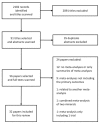The Effect of Electrolytes on Blood Pressure: A Brief Summary of Meta-Analyses
- PMID: 31212974
- PMCID: PMC6627949
- DOI: 10.3390/nu11061362
The Effect of Electrolytes on Blood Pressure: A Brief Summary of Meta-Analyses
Abstract
Nutrition is known to exert an undeniable impact on blood pressure with especially salt (sodium chloride), but also potassium, playing a prominent role. The aim of this review was to summarize meta-analyses studying the effect of different electrolytes on blood pressure or risk for hypertension, respectively. Overall, 32 meta-analyses evaluating the effect of sodium, potassium, calcium and magnesium on human blood pressure or hypertension risk were included after literature search. Most of the meta-analyses showed beneficial blood pressure lowering effects with the extent of systolic blood pressure reduction ranging between -0.7 (95% confidence interval: -2.6 to 1.2) to -8.9 (-14.1 to -3.7) mmHg for sodium/salt reduction, -3.5 (-5.2 to -1.8) to -9.5 (-10.8 to -8.1) mmHg for potassium, and -0.2 (-0.4 to -0.03) to -18.7 (-22.5 to -15.0) mmHg for magnesium. The range for diastolic blood pressure reduction was 0.03 (-0.4 to 0.4) to -5.9 (-9.7 to -2.1) mmHg for sodium/salt reduction, -2 (-3.1 to -0.9) to -6.4 (-7.3 to -5.6) mmHg for potassium, and -0.3 (-0.5 to -0.03) to -10.9 (-13.1 to -8.7) mmHg for magnesium. Moreover, sufficient calcium intake was found to reduce the risk of gestational hypertension.
Keywords: blood pressure; calcium; electrolytes; hypertension; magnesium; meta-analysis; potassium; sodium.
Conflict of interest statement
The authors declare no conflict of interest.
Figures
Similar articles
-
Epidemiological studies on the relationship between sodium, potassium, calcium, and magnesium and arterial blood pressure.J Cardiovasc Pharmacol. 1984;6 Suppl 1:S192-6. doi: 10.1097/00005344-198400061-00030. J Cardiovasc Pharmacol. 1984. PMID: 6204140
-
Feasibility and antihypertensive effect of replacing regular salt with mineral salt -rich in magnesium and potassium- in subjects with mildly elevated blood pressure.Nutr J. 2011 Sep 2;10:88. doi: 10.1186/1475-2891-10-88. Nutr J. 2011. PMID: 21888642 Free PMC article. Clinical Trial.
-
Effect of dietary electrolytes upon calcium excretion: the Yi People Study.J Hypertens. 1992 Jul;10(7):671-6. J Hypertens. 1992. PMID: 1321195
-
[Heterogenicity of hypertension: the various effects of electrolyte intake].Klin Wochenschr. 1991;69 Suppl 25:97-102. Klin Wochenschr. 1991. PMID: 1921257 Review. German.
-
Role of adequate dietary calcium intake in the prevention and management of salt-sensitive hypertension.Am J Clin Nutr. 1997 Feb;65(2 Suppl):712S-716S. doi: 10.1093/ajcn/65.2.712S. Am J Clin Nutr. 1997. PMID: 9022571 Review.
Cited by
-
Hypoglycaemic Principles of Securidaca longepedunculata Extracts Reverses Experimental Diabetes and Diabetes Associated Pathology in Wistar Albino Rats.Biochem Res Int. 2025 Jul 31;2025:7173019. doi: 10.1155/bri/7173019. eCollection 2025. Biochem Res Int. 2025. PMID: 40778292 Free PMC article.
-
Effects of the Mediterranean diet on the components of metabolic syndrome.J Prev Med Hyg. 2022 Oct 17;63(2 Suppl 3):E56-E64. doi: 10.15167/2421-4248/jpmh2022.63.2S3.2747. eCollection 2022 Jun. J Prev Med Hyg. 2022. PMID: 36479500 Free PMC article. Review.
-
The Importance of Nutrition in Hypertension.Nutrients. 2019 Oct 21;11(10):2542. doi: 10.3390/nu11102542. Nutrients. 2019. PMID: 31640287 Free PMC article.
-
Impact of Micronutrients on Hypertension: Evidence from Clinical Trials with a Special Focus on Meta-Analysis.Nutrients. 2021 Feb 10;13(2):588. doi: 10.3390/nu13020588. Nutrients. 2021. PMID: 33578935 Free PMC article. Review.
-
Point-of-care testing of hyponatremia and hypernatremia levels: An optoplasmonic biosensing approach.PLoS One. 2025 Apr 23;20(4):e0319559. doi: 10.1371/journal.pone.0319559. eCollection 2025. PLoS One. 2025. PMID: 40267126 Free PMC article.
References
-
- Rust P., Ekmekcioglu C. Impact of Salt Intake on the Pathogenesis and Treatment of Hypertension. Adv. Exp. Med. Biol. 2017;956:61–84. - PubMed
Publication types
MeSH terms
Substances
LinkOut - more resources
Full Text Sources
Medical


